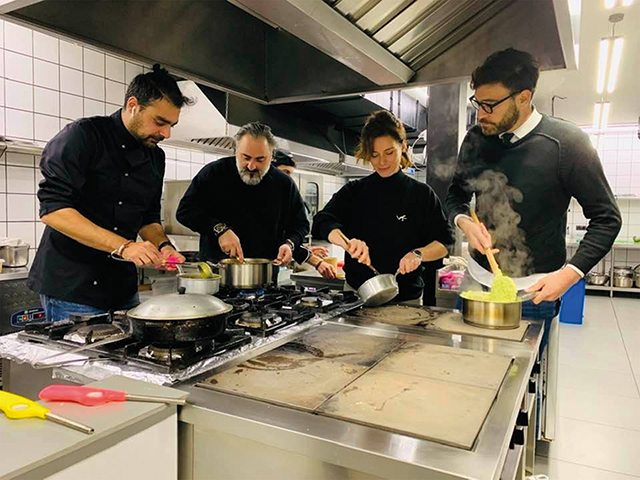The ‘Say No to Food Waste’ media campaign, kicked off in February by CENN and the British Embassy, has the aim of urging people to change their behavior and consume more responsibly to reduce food waste. The campaign strives to achieve an “awakened” culture, the members of which will act more responsibly in support of their own surroundings by reducing how much food is thrown away instead of being donated or put to alternative use. GEORGIA TODAY, ever eager to support a good cause, is one of the CENN campaign’s media partners.
This week we sat down with founder of the renowned restaurant Shavi Lomi (Black Lion), Meriko Gubeladze, to find out how she and her team combat unnecessary food waste.
“I started working in the culinary field almost by accident. I worked in restaurants in America, and when I got back in Georgia, I imagined myself in management,” Gubeladze tells us. “We’d been looking for a cook for a long time, we could not find the right person- whoever we found, it turned out I knew more. I quickly realized that in my absence, nothing had changed here. I was lucky to come back in the right time and place. Since I had a great experience, it was easy for me to head into the kitchen, and I liked it so much that I decided I wanted to stick with it. That was 12 years ago. Then we started a television show. At first, it was very interesting, introducing new products to people, like broccoli, which was new and unknown here at the time.
“We talk a lot about gastronomy, but in reality, we do not have gastronomy in this country yet. People have not yet gotten to the point where they want gastronomic experiences. But we are slowly getting there.”

How do you deal with food waste in your restaurant?
In the first place, I try not to have food leftovers, which is definitely achievable. First, there are statistics on how much the restaurant typically uses per day; second, I have a policy that everything is fresh for the day, and if that means a dish on the menu runs out by the evening, it’s no tragedy. Due to this policy, we only order in a small quantity of food. But still, if there are leftovers, they are distributed to the staff. We sometimes feed our 30 employees twice a day with leftover food. Proper management is the best way to avoid food waste.
Why bothers you most about wastage?
Throwing away goods bothers me morally. It’s bad for the environment. In our society, in fact, throwing things away, especially food, is considered bad form. My father refuses to throw anything away until it is totally beyond use!
Georgia is a poor country, many people are hungry and have no food to eat. When throwing food away, knowing that somebody might be hungry for it, it feels wrong.
Do you have any advice for other restaurants on what to do to reduce food waste?
Leftovers come about from ordering in extra produce and then not using it. This financially damages the facility. If the management is right, which is in everyone’s interest, the business should make a profit. This wasted food is a waste of a portion of this earned money. I think most restaurants these days control their stock, and I’m not sure how much they need my advice, but I would say they have to stock up on food products on a daily basis. And only as much as they need. If we still cannot count and there were more clients that day than usual, it doesn’t matter, if you run out of a product, offer the customer something else.
Every restaurant has its statistics: the average number of people who come on Monday may be low, but you know on Friday or during the holidays, you’ll have more in the restaurant. You have to work according to these numbers to avoid food waste.

Does Shavi Lomi generate enough leftovers to consider donating it?
With 30 people working in the restaurant, there’s nothing left to donate elsewhere, and this is a form of donation when the staff takes it. I don’t know what the law says and whether it can be done, but that is how we act. In short, there is almost no food waste in this restaurant.
The good thing is that there is more awareness among people now. We have a lot of foreign customers and they take their leftovers home with them. It is a daily practice to take leftover food. In the past it was shameful [to take leftovers home], but nowadays it’s a common practice. We pack the food and give it to our customers, and if there’s anything left after a big meal, our staff takes the food.
Is there a tendency in consumers to order too much food and then leave it?
I train our waiters, and when they see first-time customers ordering a lot of food, not being aware of our portion sizes, the waiters will advise them it might be too much. Also, it is expensive to order a lot, so it happens rarely.
Do customers tend to order shared meals or separate portions?
Our restaurant and Georgian people have not adopted a partial way of ordering food yet. When there are 6 people at a table, they will be unlikely to order separately: they will share a dish. This is very good part of our culture.
While buying fruit and veg, consumers tend to seek out visually pleasing products, which is one of the reasons food waste is generated. Is it important for you what the shape of a product is and how it looks?
I think the world is already heading back in the direction that admits that taste matters more than looks. I don’t think all tomatoes should be the same size. It doesn’t matter to me what shape the product is.
Abroad, especially in America, there is a trend that unpackaged products cannot be sold in supermarkets and are only sold in restaurants. This is not the case in Georgia, but if it is introduced, how acceptable will it be for you?
We don’t buy our food from supermarkets; we buy our products mainly from the agrarian market, where, in any case, you have more choice than at a supermarket. We also try to go directly to the supplier and buy the product directly from them and not from a reseller.
When food is brought in bulk directly from the farm, it can get damaged and wasted.
Agriculture is not so developed in our country; farmers have many problems. One practice is for a farmer to post on social media that they are coming, say, on Sunday, and we go specially to meet them and buy their product. This has been happening more often lately, and it’s good. In other cases, the product is in the hands of the seller and is more expensive.
How do you set your menu?
Ours is a seasonal menu, and it’s the most logical way for people to eat. I don’t remember eating cucumber and tomato in winter in my childhood; it was a seasonal dish and for that very reason, it has its own charm. Now we have gotten to the point that we always have everything. The quality is not so good, but we still have it. People are still expecting a cucumber-tomato salad to be on the menu at the restaurant, and the restaurant finds it very difficult to take the step of not offering it.
Are cooks these days becoming more environmentally sensitive?
We still lack a lot, and education is very important for that.
Is providing environmental information and information on food waste part of the training in America?
The first shock that came to me when I arrived in America, was that there were 3-4 different garbage bins outside houses to separate waste. My time there had a big impact on me. In our country, someone should raise awareness about this, and I think Georgians have the ability to assimilate this knowledge, there should be a law and this law should be enforced. There are many laws in our country that are absurd and go unfulfilled, but I believe law grows society and if the law is regulated, society will get used to it.
I still think that because restaurants are a business, food waste is rarely a problem. I’d be surprised if businesses are throwing food away. This problem is probably higher in families.
Transcribed by Ketevan Skhirtladze
















